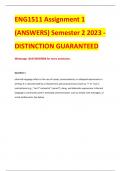ENG1511 Assignment 1
(ANSWERS) Semester 2 2023 -
DISTINCTION GUARANTEED
Whatsapp +254740539068 for more assistance.
Question 1
Informal language refers to the use of casual, conversational, or colloquial expressions in
writing. It is characterized by a relaxed tone, personal pronouns (such as "I" or "you"),
contractions (e.g., "can't" instead of "cannot"), slang, and idiomatic expressions. Informal
language is commonly used in everyday communication, such as emails, text messages, or
social media posts. See below
, Informal language refers to the use of casual, conversational, or colloquial expressions in
writing. It is characterized by a relaxed tone, personal pronouns (such as "I" or "you"),
contractions (e.g., "can't" instead of "cannot"), slang, and idiomatic expressions. Informal
language is commonly used in everyday communication, such as emails, text messages, or
social media posts.
However, in academic writing, it is generally not appropriate to use informal language.
Academic writing requires a more formal and objective tone to convey ideas clearly and
professionally. Here are a few reasons why informal language should be avoided in academic
writing:
1. Clarity and Precision: Academic writing aims to communicate ideas accurately and
precisely. Informal language can lead to ambiguity or confusion, as it may lack the
necessary clarity and specificity.
2. Professionalism: Academic writing is a formal genre that requires a professional tone.
Using informal language can undermine the credibility and authority of the writer.
3. Audience Expectations: Academic writing is typically intended for a scholarly audience,
such as professors, researchers, or peers. These readers expect a certain level of
formality and adherence to academic conventions.
4. Objectivity: Academic writing should strive for objectivity and impartiality. Informal
language, with its subjective and personal tone, may introduce bias or emotional
language that is not appropriate in academic discourse.
5. Consistency: Academic writing follows specific style guides, such as APA or MLA, which
provide guidelines for language usage. These style guides generally discourage the use
of informal language.
To maintain a formal and academic tone, it is advisable to use standard English, avoid slang or
colloquial expressions, and adhere to the conventions of academic writing. It is important to




